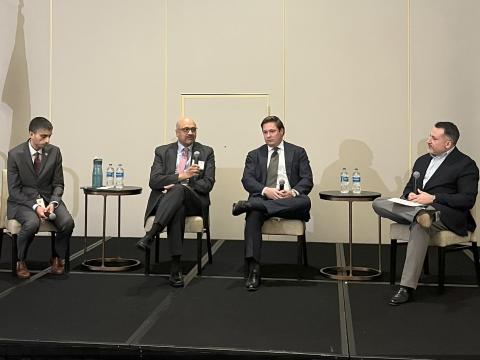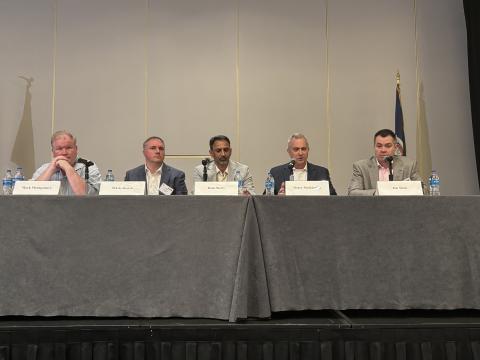Inciting a Cultural Evolution
If we really believe a network-centric coalition/joint force offers an opportunity for effects-based conflict in the future—and that this same network-centric force improves lethality, intelligence sharing and command and control—then why aren’t we embracing the concept of changing the culture to match the technology capabilities that Free World industry is offering to warfighters in the fight for freedom?
From the outside, it appears as if we are doing business as usual too often. To all appearances, we are maintaining stovepipes that prevent us from moving in the direction advocated by Secretary of Defense Donald Rumsfeld; transformation chief Vice Adm. Arthur Cebrowski, USN (Ret.); Joint Chiefs of Staff Chairman Gen. Richard B. Myers, USAF; and other senior leaders in the U.S. Defense Department—as well as the leadership of the homeland security and intelligence communities. They are joined by many allied leaders overseas who believe that network centricity is required for successful future warfare.
It is one thing to build viewgraphs and talk about cultural change in Washington, D.C., yet it is another to take action and change the culture to allow us to take advantage of the tools that are readily available. For example, the Intelligence Community Multi-intelligence Acquisition Program, or IC MAP, recently was cited as the backbone of horizontal integration required by the intelligence community. IC MAP has been on everyone’s radar for the past few months. However, each separate intelligence pillar now seems to be stating that, because its people are not in charge of the program, IC MAP must not be the right solution—instead of signing up to ensure that IC MAP is the solution. Elements of the Defense Department have displayed similar proclivities between the services for Distributed Common Ground System (DCGS) Block 10.2 for moving information to the warfighter.
The majority of senior speakers at recent AFCEA events have suggested that cultural change is a requirement for transformation and, therefore, a network-centric force. Yet, to my knowledge no one has offered us a road map to change that culture. If we have defined the problem as a cultural problem, then when are we going to have someone say, “These are the things that need to be done,” and start implementing irresistible forces for cultural change?
We need to stop talking about cultural change and start making it happen. To do this, we should enforce cultural change throughout the military with an incentive system. And, we should focus on the individual as the agent of change. The only way to ensure a network-centric force is to ensure the presence of individuals who are dedicated to network centricity.
The first step we should take in this effort can be through the personnel arena. Those who are moving us toward a network-centric force should be rewarded for their efforts—not just for their good deeds, but to move them ahead of others who are not committed to enabling network centricity. This will both advance the careers of network-centric advocates and spur others to join the drive to digitally unite the force.
An officer’s fitness report can include a block noting whether that officer has worked to advance network-centric concepts and to break down the existing culture. For example, when the military services were having problems with race relations, each officer’s fitness report featured a block that measured whether that person had contributed to improving the climate of race relations. A negative return prevented that individual from being promoted. Today, a network-centric comment requirement in evaluations similarly could determine whether an officer is promoted—or not.
The civilian work force could receive its incentives in the form of monetary bonuses. Individuals who further advances in network centricity would receive larger bonuses than could those who are lacking in that effort. Personnel awards and letters of appreciation could add to the incentive package.
The military is well armed to reward an individual who delivers an effective platform to the military. The military must be as likely to reward an individual who delivers a network-centric capability.
We also can implement financial incentives for network-centric operations for commands. If a defense organization or a service begins to move ahead of its peers in enabling network centricity, then that organization or service can be allocated a larger part of the information technology budget.
Wherever we focus our efforts, some positive incentive is necessary to change the culture. The culture will not change just because it has been defined as the problem. The director of central intelligence, the Department of Homeland Security secretary and the secretary of defense all must put in place positive incentives for moving the military toward a network-centric force.
In general, people are frustrated by the culture called bureaucracy, especially because one of its characteristics is that it resists change. While that trait is not always a negative—the U.S. Constitution serves the United States well because it resists change—the bureaucracy animal unfortunately resists all change, even if that change is the improvement offered by information technology. Well-defined incentives are the best tool for overcoming organizational inertia. Their implementation can spawn a true cultural evolution that rewards everyone with a fully network-centric force.




Comments